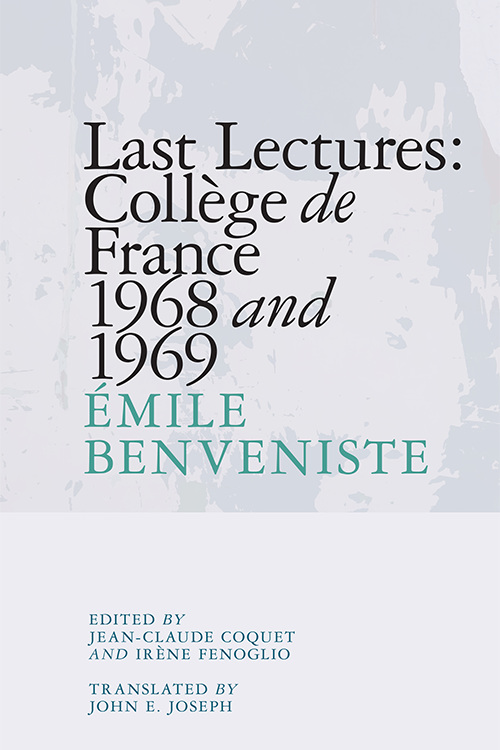
John J. Joseph, editor of Last Lectures, talks about the process of bringing Émile Benveniste to an English-speaking audience.
‘It’s been a great privilege for me to play a role in making Benveniste’s last lectures available to a wider audience.’
Benveniste the Linguist
Émile Benveniste (1902–1976) was the foremost French linguist of the twentieth century. He established his reputation in the 1930s with work that applied the modernist outlook of structuralism to historical linguistics. In the 1950s he developed close professional relationships with Claude Lévi-Strauss and Jacques Lacan, and the publication of his Problems in General Linguistics in 1966 brought him a wider audience, including such figures as Roland Barthes, Jacques Derrida and Pierre Bourdieu, as well as two younger scholars, both newly arrived from Bulgaria, Julia Kristeva and Tzvetan Todorov.
Benveniste and the International Association for Semiotics Study
In 1968 Benveniste’s work took a significant new turn. He was made President of the newly created International Association for Semiotics Studies – but it wasn’t at all clear that an international society could bridge the gap between the American tradition of semiotics initiated by Charles Sanders Peirce, and the European tradition that went back to Ferdinand de Saussure.
In his opening address at the Association’s first meeting, Benveniste confronted the divide head on, putting the case for the complementary coexistence of, on the one hand, semiotic analysis of languages as self-contained systems of values generated by difference, à la Saussure; on the other, semantic analysis of ‘enunciation’, what speakers do with the language and how the system relates to the world which it represents, à la Peirce.
Benveniste at the Collège de France
Three months later, Benveniste began his series of lectures in the Collège de France for 1968-1969 with this same question, pursuing it in greater depth. He analyses various types of sign systems – traffic signals, art, music – in an attempt to pin down what makes languages unique. He argues that only language is ‘auto-semiotising’: every other sign system relies on language as its interpretant, in Peirce’s term, to express its meaning. A language, in contrast, is its own interpretant.
For the second semester, Benveniste took on another topic: how writing functions as a semiotic system distinct from language – and yet not distinct in the same way as, say, music is. The lectures for this semester include detailed surveys of the major world writing systems, their histories and modes of functioning. Writing, Benveniste concludes, is the ‘relay’ of speech; it’s what makes the auto-semiotisation of language possible.
This is a conclusion fraught with difficulties, and in December 1969, in his first lecture for the academic year 1969-1970, Benveniste announced his intention to confront them. But two days before the second lecture was to take place, he suffered a debilitating stroke that left him paralysed and unable to speak for the remaining seven years of his life. His outline notes for the lectures to follow are included in the present volume.
The Reconstruction of the Last Lectures
The text of these Last Lectures has been reconstructed from Benveniste’s notes and notes made by three of those in attendance. One of the three, Jean-Claude Coquet, worked with the textual historian Irène Fenoglio to produce the book originally published in 2012 as Dernières leçons: Collège de France, 1968 et 1969, with a preface by Kristeva and an afterword by Todorov, plus other material including excerpts from an unpublished biography of Benveniste by his confidante, the linguist Georges Redard.
Kristeva’s preface and Todorov’s afterword include moving reminiscences of their visits to Benveniste during the long years of his silent paralysis, along with invaluable insights into the thinking that lay behind these final lectures. The introduction by editors Coquet and Fenoglio is likewise an important contribution to the understanding of Benveniste’s thought. My own translator’s introduction aims to situate the lectures contextually for English-language readers, as well as discussing the thorny terminological issues that translations inevitably bring to the fore.
Last Lectures: Collège de France 1968 and 1969 by Émile Benveniste is published by Edinburgh University Press.





